
Journal Menu
► ▼ Journal Menu-
- Brain Sciences Home
- Aims & Scope
- Editorial Board
- Reviewer Board
- Topical Advisory Panel
- Instructions for Authors
- Special Issues
- Topics
- Sections & Collections
- Article Processing Charge
- Indexing & Archiving
- Editor’s Choice Articles
- Most Cited & Viewed
- Journal Statistics
- Journal History
- Journal Awards
- Society Collaborations
- Conferences
- Editorial Office
Journal Browser
► ▼ Journal BrowserNeed Help?
Announcements
30 April 2024
MDPI Opens Office in Seoul, Korea and Appoints Claude Seo as Office Manager

MDPI, the leading Open Access (OA) publisher, announced on Monday that it opened its Korean branch office on 29th April 2024. With this addition, MDPI now operates 21 offices in 12 countries worldwide. Claude Seo, with over 20 years of experience in the academic journal publishing industry, including Nature Publishing Group (NPG), has been appointed as the Office Manager of the Seoul office.
With the establishment of a Seoul office, MDPI aims to actively support Korea scientific communities to further promote the publication of OA journals in the region. As of the end of 2023, Korea ranked sixth worldwide in both submissions and publications of MDPI research papers. MDPI is the number one OA publisher in Korea.
Sungkyunkwan University Joins MDPI’s Institutional Open Access Program
In addition, MDPI announced that Sungkyunkwan University joined MDPI’s Institutional Open Access Program (IOAP). This program offers free access to MDPI online submission system for the institutions and APC discounts to affiliated authors. Thirteen major Korean universities, including Sungkyunkwan University, Kyung Hee University, Chung-Ang University and Catholic University of Korea, have adopted IOAP in Korea.
OA aims to break down barriers that have traditionally restricted access to science, ensuring that knowledge is available to all, regardless of financial situation or institutional affiliations. Authors, academia, and scientific communities are rapidly moving toward OA. MDPI has been at the forefront of reshaping the academic publishing landscape, with OA surpassing subscription-based publishing in 2020.
MDPI CEO Visits Seoul, Korea
In March, Stefan Tochev, Chief Executive Officer (CEO) of MDPI, visited Korea and met with various stakeholders including government agencies, research and academic institutions, universities. During his visit, Stefan highlighted that MDPI continues to pave the way for a world where science is accessible to all, supporting a global community of inclusive innovation and collaborative solutions.
Stefan expressed excitement about the new venture, stating, "Today marks a significant milestone for MDPI as we celebrate the opening of our new office in Seoul, Korea. This expansion is more than just an increase in our physical footprint, it is a pivotal step in our ongoing commitment to making scientific knowledge more accessible, participatory, and inclusive across the globe."
Claude Seo, reflecting on his new role, commented, "I am delighted to have been offered this position of trust within MDPI, the no. 1 scholarly OA publisher. As we establish our presence in Korea, we are dedicated to integrating into the local community and contributing to its vibrant culture. Our commitment goes beyond business growth; it is about creating a more informed and innovative society by embracing and promoting diversity within the scientific community.”
For further inquiries, please contact our Seoul office directly.
About MDPI
A pioneer in scholarly, open access publishing, MDPI has supported academic communities since 1996. MDPI is leading the transition to open science by making more research free and accessible to everyone. Over 3.3 million researchers have entrusted MDPI with publishing their scientific discoveries. MDPI’s editorial process is bolstered by a network of dedicated reviewers, a team of 6000 diligent, well-trained staff members, and an in-house article submission platform that was designed to ensure efficient processes within its 430 fully OA titles.
25 April 2024
Brain Sciences | Highly Cited Papers in 2022–2023 in the Section “Psychiatric Diseases”
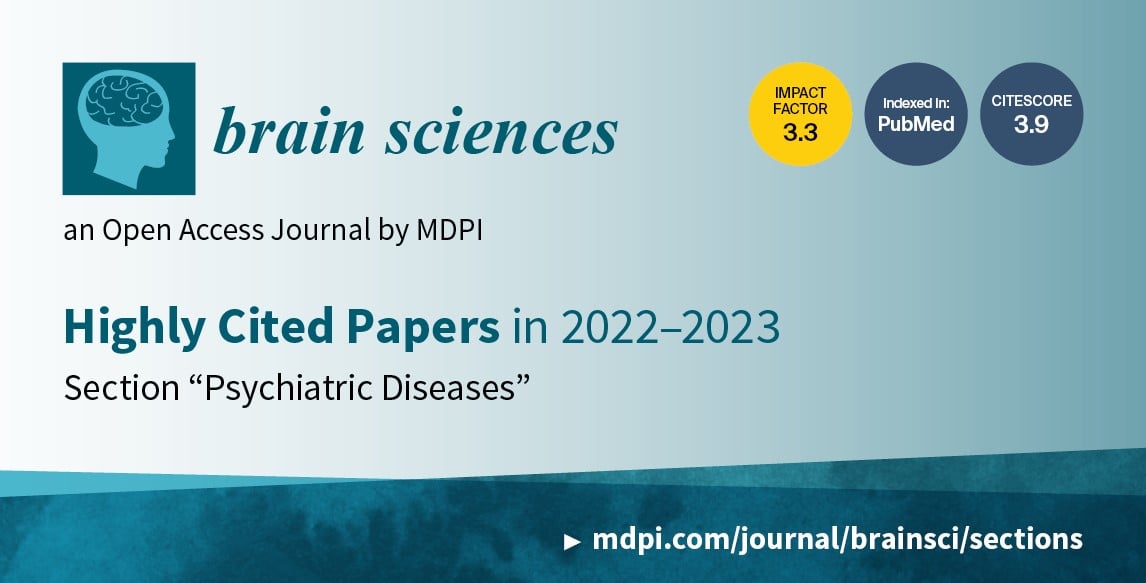
The “Psychiatric Diseases” Section of the journal Brain Sciences (ISSN: 2076-3425) gathers the best available scientific evidence to guide clinical practice in the treatment of psychiatric illnesses. Original articles and reviews that advance our understanding of the etiology, course, and treatment of psychiatric illnesses are welcome. Papers reporting sound evidence-based practices that safeguard against reporting bias and promote the reproducibility of study procedures and the replicability of results, for example, through the preregistration of study hypotheses, will also be highly valued.
As all of the articles published in our journal are of an open access format, you have free and unlimited access to the full texts. We welcome you to read our most highly cited papers published in 2022 and 2023 listed below:
1. “The Elephant in the Room: A Cross-Sectional Study on the Stressful Psychological Effects of the COVID-19 Pandemic in Mental Healthcare Workers”
by Alessandra Minelli, Rosana Carvalho Silva, Stefano Barlati, Marika Vezzoli, Sara Carletto, Cinzia Isabello, Marco Bortolomasi, Gabriele Nibbio, Jacopo Lisoni, Valentina Menesello et al.
Brain Sci. 2022, 12(3), 408; https://doi.org/10.3390/brainsci12030408
Available online: https://www.mdpi.com/2076-3425/12/3/408
2. “Substance Use in the Transgender Population: A Meta-Analysis”
by Miriam Cotaina, Marc Peraire, Mireia Boscá, Iván Echeverria, Ana Benito and Gonzalo Haro
Brain Sci. 2022, 12(3), 366; https://doi.org/10.3390/brainsci12030366
Available online: https://www.mdpi.com/2076-3425/12/3/366
3. “Neutrophil-to-Lymphocyte, Monocyte-to-Lymphocyte, Platelet-to-Lymphocyte Ratio and Systemic Immune-Inflammatory Index in Different States of Bipolar Disorder”
by Katerina Dadouli, Michel B. Janho, Apostolia Hatziefthimiou, Ioanna Voulgaridi, Konstantina Piaha, Lemonia Anagnostopoulos, Panagiotis Ntellas, Varvara A. Mouchtouri, Konstantinos Bonotis, Nikolaos Christodoulou et al.
Brain Sci. 2022, 12(8), 1034; https://doi.org/10.3390/brainsci12081034
Available online: https://www.mdpi.com/2076-3425/12/8/1034
4. “Neurobiology of the Orexin System and Its Potential Role in the Regulation of Hedonic Tone”
by Martin A. Katzman and Matthew P. Katzman
Brain Sci. 2022, 12(2), 150; https://doi.org/10.3390/brainsci12020150
Available online: https://www.mdpi.com/2076-3425/12/2/150
5. “Cytokines and Neurodegeneration in Epileptogenesis”
by Pawel Wolinski, Dominika Ksiazek-Winiarek and Andrzej Glabinski
Brain Sci. 2022, 12(3), 380; https://doi.org/10.3390/brainsci12030380
Available online: https://www.mdpi.com/2076-3425/12/3/380
6. “Ketamine as a Novel Psychopharmacotherapy for Eating Disorders: Evidence and Future Directions”
by Anya Ragnhildstveit, Matthew Slayton, Laura Kate Jackson, Madeline Brendle, Sachin Ahuja, Willis Holle, Claire Moore, Kellie Sollars, Paul Seli and Reid Robison
Brain Sci. 2022, 12(3), 382; https://doi.org/10.3390/brainsci12030382
Available online: https://www.mdpi.com/2076-3425/12/3/382
7. “A Brief Introduction to Magnetoencephalography (MEG) and Its Clinical Applications”
by Alfred Lenin Fred, Subbiahpillai Neelakantapillai Kumar, Ajay Kumar Haridhas, Sayantan Ghosh, Harishita Purushothaman Bhuvana, Wei Khang Jeremy Sim, Vijayaragavan Vimalan, Fredin Arun Sedly Givo, Veikko Jousmäki, Parasuraman Padmanabhan et al.
Brain Sci. 2022, 12(6), 788; https://doi.org/10.3390/brainsci12060788
Available online: https://www.mdpi.com/2076-3425/12/6/788
8. “Endocannabinoid System and Exogenous Cannabinoids in Depression and Anxiety: A Review”
by Ahmed Hasbi, Bertha K. Madras and Susan R. George
Brain Sci. 2023, 13(2), 325; https://doi.org/10.3390/brainsci13020325
Available online: https://www.mdpi.com/2076-3425/13/2/325
9. “The Role of Brain-Derived Neurotrophic Factor (BDNF) in Diagnosis and Treatment of Epilepsy, Depression, Schizophrenia, Anorexia Nervosa and Alzheimer’s Disease as Highly Drug-Resistant Diseases: A Narrative Review”
by Aleksandra Gliwińska, Justyna Czubilińska-Łada, Gniewko Więckiewicz, Elżbieta Świętochowska, Andrzej Badeński, Marta Dworak and Maria Szczepańska
Brain Sci. 2023, 13(2), 163; https://doi.org/10.3390/brainsci13020163
Available online: https://www.mdpi.com/2076-3425/13/2/163
10. “Measuring Social Camouflaging in Individuals with High Functioning Autism: A Literature Review”
by Ivan Mirko Cremone, Barbara Carpita, Benedetta Nardi, Danila Casagrande, Rossella Stagnari, Giulia Amatori and Liliana Dell’Osso
Brain Sci. 2023, 13(3), 469; https://doi.org/10.3390/brainsci13030469
Available online: https://www.mdpi.com/2076-3425/13/3/469
22 April 2024
Brain Sciences | High Quality Papers in 2022–2023 in the Section “Sensory and Motor Neuroscience”
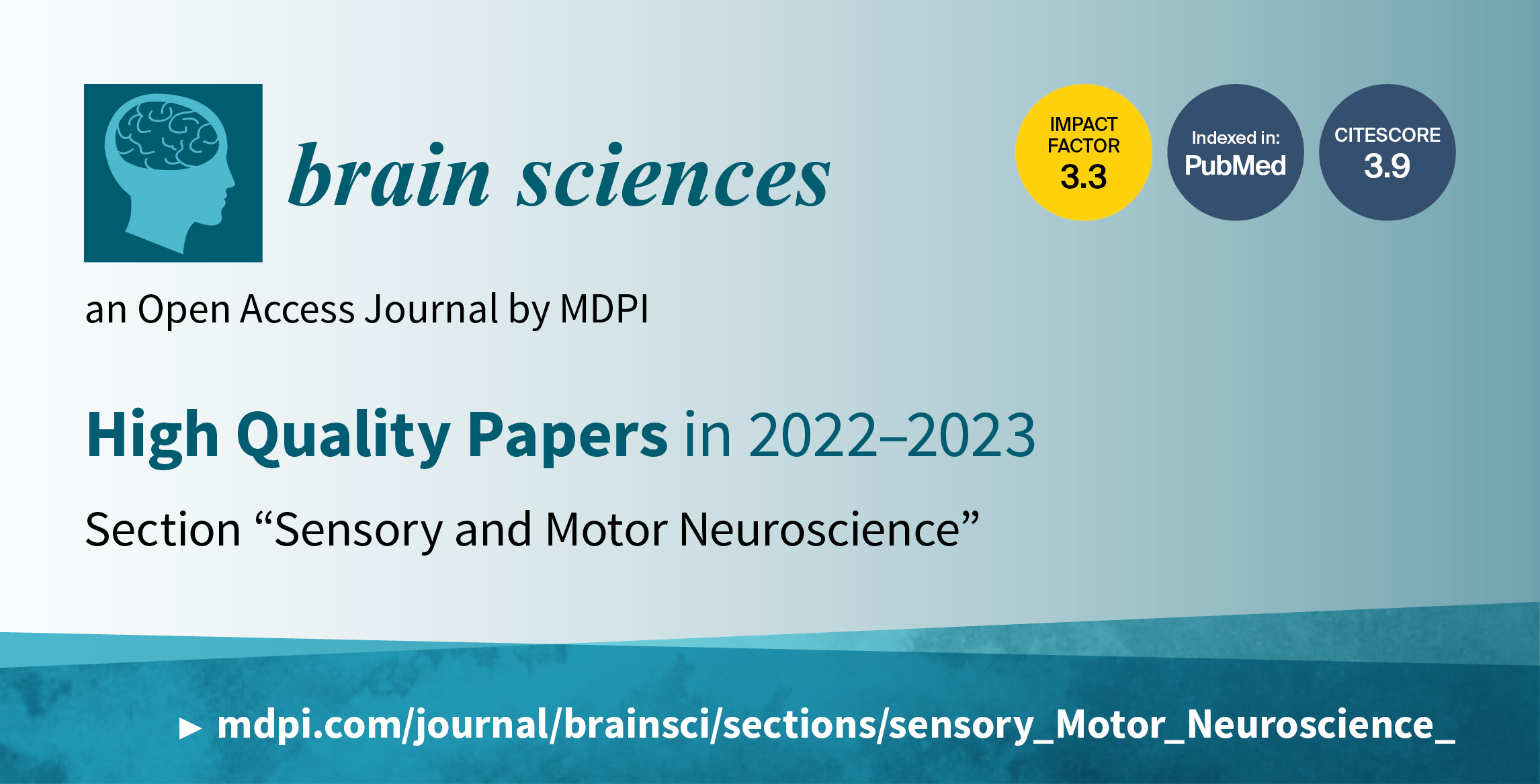
The “Sensory and Motor Neuroscience” Section of Brain Sciences (ISSN: 2076-3425) aims to publish articles on sensorimotor transformation and the modulation of sensory and motor function, among other topics.
As all of the articles published in our journal are of an open access format, you have free and unlimited access to the full text. We welcome you to read our most high quality papers published in 2022 and 2023, listed below.
1. “Modulating Cognitive–Motor Multitasking with Commercial-off-the-Shelf Non-Invasive Brain Stimulation”
by Nathan Ward, Erika Hussey, Thomas Wooten, Elizabeth Marfeo and Tad T. Brunyé
Brain Sci. 2022, 12(2), 180; https://doi.org/10.3390/brainsci12020180
Available online: https://www.mdpi.com/2076-3425/12/2/180
2. “Validating a Portable Device for Blinking Analyses through Laboratory Neurophysiological Techniques”
by Giulia Paparella, Alessandro De Biase, Antonio Cannavacciuolo, Donato Colella, Massimiliano Passaretti, Luca Angelini, Andrea Guerra, Alfredo Berardelli and Matteo Bologna
Brain Sci. 2022, 12(9), 1228; https://doi.org/10.3390/brainsci12091228
Available online: https://www.mdpi.com/2076-3425/12/9/1228
3. “Emotional Imagery Influences the Adaptive Force in Young Women: Unpleasant Imagery Reduces Instantaneously the Muscular Holding Capacity”
by Laura V. Schaefer, Silas Dech, Lara L. Wolff and Frank N. Bittmann
Brain Sci. 2022, 12(10), 1318; https://doi.org/10.3390/brainsci12101318
Available online: https://www.mdpi.com/2076-3425/12/10/1318
4. “Biomechanical Analysis of Unplanned Gait Termination According to a Stop-Signal Task Performance: A Preliminary Study”
by Dong-Kyun Koo and Jung-Won Kwon
Brain Sci. 2023, 13(2), 304; https://doi.org/10.3390/brainsci13020304
Available online: https://www.mdpi.com/2076-3425/13/2/304
5. “The Effect of Cognitive Task Complexity on Healthy Gait in the Walking Corsi Test”
by Nicola Camp, Roberto Vagnetti, Maria Bisele, Paul Felton, Kirsty Hunter and Daniele Magistro
Brain Sci. 2023, 13(7), 1019; https://doi.org/10.3390/brainsci13071019
Available online: https://www.mdpi.com/2076-3425/13/7/1019
6. “Source Localization of Audiovisual Multisensory Neural Generators in Young Adults with Attention-Deficit/Hyperactivity Disorder”
by Heather S. McCracken, Bernadette A. Murphy, Ushani Ambalavanar, Cheryl M. Glazebrook and Paul C. Yielder
Brain Sci. 2022, 12(6), 809; https://doi.org/10.3390/brainsci12060809
Available online: https://www.mdpi.com/2076-3425/12/6/809
7. “The Contribution of Visual and Auditory Working Memory and Non-Verbal IQ to Motor Multisensory Processing in Elementary School Children”
by Areej A. Alhamdan, Melanie J. Murphy, Hayley E. Pickering and Sheila G. Crewther
Brain Sci. 2023, 13(2), 270; https://doi.org/10.3390/brainsci13020270
Available online: https://www.mdpi.com/2076-3425/13/2/270
8. “Improved Spatial Knowledge Acquisition through Sensory Augmentation”
by Vincent Schmidt, Sabine U. König, Rabia Dilawar, Tracy Sánchez Pacheco and Peter König
Brain Sci. 2023, 13(5), 720; https://doi.org/10.3390/brainsci13050720
Available online: https://www.mdpi.com/2076-3425/13/5/720
9. “Probing the Promises of Noninvasive Transcranial Electrical Stimulation for Boosting Mental Performance in Sports”
by Stephane Perrey
Brain Sci. 2023, 13(2), 282; https://doi.org/10.3390/brainsci13020282
Available online: https://www.mdpi.com/2076-3425/13/2/282
10. “Source Localization of Somatosensory Neural Generators in Adults with Attention-Deficit/Hyperactivity Disorder”
by Heather S. McCracken, Bernadette A. Murphy, Ushani Ambalavanar, Cheryl M. Glazebrook and Paul C. Yielder
Brain Sci. 2023, 13(2), 370; https://doi.org/10.3390/brainsci13020370
Available online: https://www.mdpi.com/2076-3425/13/2/370
15 April 2024
Brain Sciences | Highly Cited Papers in 2022–2023 in the Section “Neuro-otology and Neuro-ophthalmology”
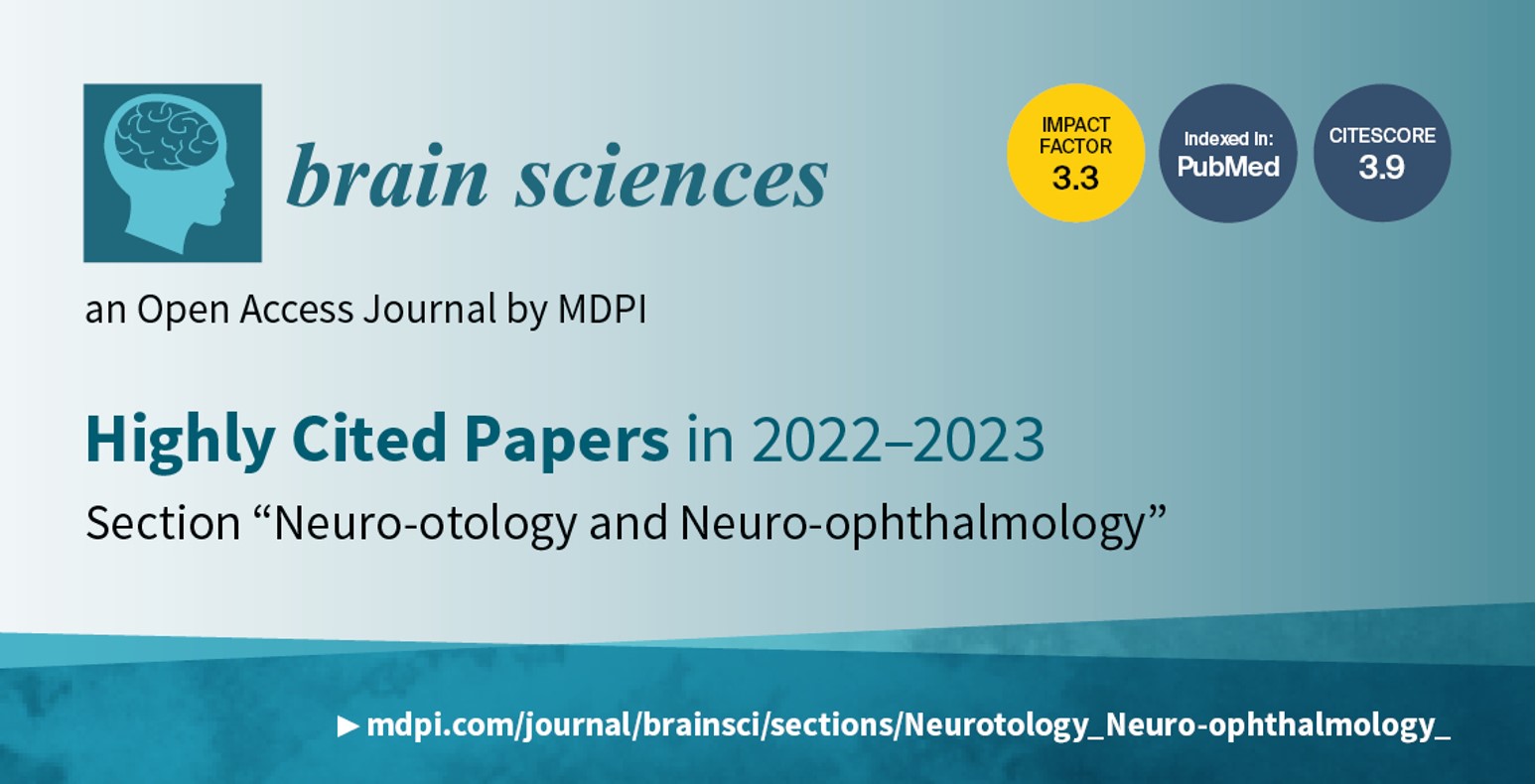
The “Neuro-otology and Neuro-ophthalmology” Section of Brain Sciences (ISSN: 2076-3425) aims to publish articles on neuro-ophthalmology, neuro-otology, vestibular disorders, vertigo, dizziness, visual system disorders, optic neuritis, optic neuropathy, papilledema, tinnitus and hearing impairment, etc.
All of the articles published in our journal are in an open access format, meaning that you have free and unlimited access to the full texts. We welcome you to read our most highly cited papers published in 2022 and 2023, listed below:
1. “Artificial Intelligence Frameworks to Detect and Investigate the Pathophysiology of Spaceflight Associated Neuro-Ocular Syndrome (SANS)”
by Joshua Ong, Ethan Waisberg, Mouayad Masalkhi, Sharif Amit Kamran, Kemper Lowry, Prithul Sarker, Nasif Zaman, Phani Paladugu, Alireza Tavakkoli and Andrew G. Lee
Brain Sci. 2023, 13(8), 1148; https://doi.org/10.3390/brainsci13081148
Available online: https://www.mdpi.com/2076-3425/13/8/1148
2. “Autoimmune Vestibulopathy—A Case Series”
by Surangi Mendis, Nicola Longley, Simon Morley, George Korres and Diego Kaski
Brain Sci. 2022, 12(3), 306; https://doi.org/10.3390/brainsci12030306
Available online: https://www.mdpi.com/2076-3425/12/3/306
3. “The Clinical Profile of Cat-Scratch Disease’s Neuro-Ophthalmological Effects”
by Sanda Jurja, Alina Zorina Stroe, Mihaela Butcaru Pundiche, Silviu Docu Axelerad, Garofita Mateescu, Alexandru Octavian Micu, Raducu Popescu, Antoanela Oltean and Any Docu Axelerad
Brain Sci. 2022, 12(2), 217; https://doi.org/10.3390/brainsci12020217
Available online: https://www.mdpi.com/2076-3425/12/2/217
4. “Optical Coherence Tomography in Chronic Relapsing Inflammatory Optic Neuropathy, Neuromyelitis Optica and Multiple Sclerosis: A Comparative Study”
by Maziar Eslami, Samuel Lichtman-Mikol, Sara Razmjou and Evanthia Bernitsas
Brain Sci. 2022, 12(9), 1140; https://doi.org/10.3390/brainsci12091140
Available online: https://www.mdpi.com/2076-3425/12/9/1140
5. “A Combined Image- and Coordinate-Based Meta-Analysis of Whole-Brain Voxel-Based Morphometry Studies Investigating Subjective Tinnitus”
by Punitkumar Makani, Marc Thioux, Sonja J. Pyott and Pim van Dijk
Brain Sci. 2022, 12(9), 1192; https://doi.org/10.3390/brainsci12091192
Available online: https://www.mdpi.com/2076-3425/12/9/1192
6. “Early Diagnosis of Central Disorders Mimicking Horizontal Canal Cupulolithiasis”
by Paula Peña Navarro, Sofía Pacheco López, Cristina Nicole Almeida Ayerve, Susana Marcos Alonso, José Manuel Serradilla López, Santiago Santa Cruz Ruiz, José Carlos Gómez Sánchez, Diego Kaski and Ángel Batuecas Caletrío
Brain Sci. 2023, 13(4), 562; https://doi.org/10.3390/brainsci13040562
Available online: https://www.mdpi.com/2076-3425/13/4/562
7. “Effects of Physical Interventions on Subjective Tinnitus, a Systematic Review and Meta-Analysis”
by Eric J. Bousema, Elouise A. Koops, Pim van Dijk and Pieter U. Dijkstra
Brain Sci. 2023, 13(2), 226; https://doi.org/10.3390/brainsci13020226
Available online: https://www.mdpi.com/2076-3425/13/2/226
8. “The Effects of Vibro-Tactile Biofeedback Balance Training on Balance Control and Dizziness in Patients with Persistent Postural-Perceptual Dizziness (PPPD)”
by Claudia Candreia, Heiko M. Rust, Flurin Honegger and John H. J. Allum
Brain Sci. 2023, 13(5), 782; https://doi.org/10.3390/brainsci13050782
Available online: https://www.mdpi.com/2076-3425/13/5/782
9. “Comparison of Active Bone Conduction Hearing Implant Systems in Unilateral and Bilateral Conductive or Mixed Hearing Loss”
by Andrea Canale, Anastasia Urbanelli, Maria Gragnano, Valerio Bordino and Andrea Albera
Brain Sci. 2023, 13(8), 1150; https://doi.org/10.3390/brainsci13081150
Available online: https://www.mdpi.com/2076-3425/13/8/1150
10. “Individualized Vibrotactile Neurofeedback Training in Patients with Chronic Bilateral Vestibulopathy”
by Dietmar Basta, Marcos Rossi-Izquierdo, Kai Wonneberger, Cibele Brugnera, Roseli Saraiva Moreira Bittar, Mário Edvin Greters, Arne Ernst and Andrés Soto-Varela
Brain Sci. 2023, 13(8), 1219; https://doi.org/10.3390/brainsci13081219
Available online: https://www.mdpi.com/2076-3425/13/8/1219
11 April 2024
Brain Sciences | Highly Cited Papers in 2022–2023 in the Section “Neuropsychology”
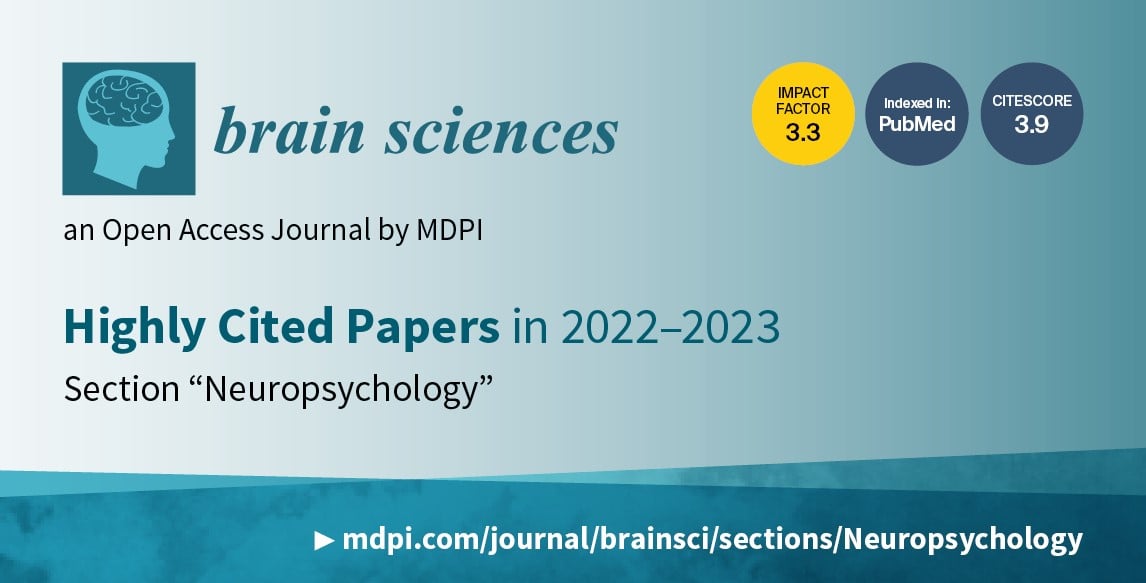
The “Neuropsychology” Section of Brain Sciences (ISSN: 2076-3425) aims to consolidate research on the relationship between the brain and human cognitive, emotional, and behavioral function. Neuropsychological testing typically evaluates individual functioning in a number of areas, including sensorimotor functions, perception, attention, spatial construction, intelligence, executive functions, memory, language, motivation, emotion, and quality of life.
As all articles published in our journal are open access, you have free and unlimited access to the full text. We welcome you to read our most highly cited papers published in 2022 and 2023, as listed below:
1. “Validation of a Light EEG-Based Measure for Real-Time Stress Monitoring during Realistic Driving”
by Nicolina Sciaraffa, Gianluca Di Flumeri, Daniele Germano, Andrea Giorgi, Antonio Di Florio, Gianluca Borghini, Alessia Vozzi, Vincenzo Ronca, Rodrigo Varga, Marteyn van Gasteren et al.
Brain Sci. 2022, 12(3), 304; https://doi.org/10.3390/brainsci12030304
Available online: https://www.mdpi.com/2076-3425/12/3/304
2. “Evidence from ERP and Eye Movements as Markers of Language Dysfunction in Dyslexia”
by Aikaterini Premeti, Maria Pia Bucci and Frédéric Isel
Brain Sci. 2022, 12(1), 73; https://doi.org/10.3390/brainsci12010073
Available online: https://www.mdpi.com/2076-3425/12/1/73
3. “Clinical Manifestations of Body Memories: The Impact of Past Bodily Experiences on Mental Health”
by Antje Gentsch and Esther Kuehn
Brain Sci. 2022, 12(5), 594; https://doi.org/10.3390/brainsci12050594
Available online: https://www.mdpi.com/2076-3425/12/5/594
4. “Automaticity and Executive Abilities in Developmental Dyslexia: A Theoretical Review”
by James H. Smith-Spark and Rebecca Gordon
Brain Sci. 2022, 12(4), 446; https://doi.org/10.3390/brainsci12040446
Available online: https://www.mdpi.com/2076-3425/12/4/446
5. “A Systematic Review of Structural and Functional MRI Studies Investigating Social Networking Site Use”
by Michael Wadsley and Niklas Ihssen
Brain Sci. 2023, 13(5), 787; https://doi.org/10.3390/brainsci13050787
Available online: https://www.mdpi.com/2076-3425/13/5/787
6. “Toxicity of Synthetic Cannabinoids in K2/Spice: A Systematic Review”
by Mariana Campello de Oliveira, Mariana Capelo Vides, Dângela Layne Silva Lassi, Julio Torales, Antonio Ventriglio, Henrique Silva Bombana, Vilma Leyton, Cintia de Azevedo-Marques Périco, André Brooking Negrão, André Malbergier et al.
Brain Sci. 2023, 13(7), 990; https://doi.org/10.3390/brainsci13070990
Available online: https://www.mdpi.com/2076-3425/13/7/990
7. “The Relationship between Short- and Long-Term Memory Is Preserved across the Age Range”
by Giedrė Čepukaitytė, Jude L. Thom, Melvin Kallmayer, Anna C. Nobre and Nahid Zokaei
Brain Sci. 2023, 13(1), 106; https://doi.org/10.3390/brainsci13010106
Available online: https://www.mdpi.com/2076-3425/13/1/106
8. “Neurocognitive Deficits in First-Episode and Chronic Psychotic Disorders: A Systematic Review from 2009 to 2022”
by Nadja Tschentscher, Christian F. J. Woll, Julia C. Tafelmaier, Dominik Kriesche, Julia C. Bucher, Rolf R. Engel and Susanne Karch
Brain Sci. 2023, 13(2), 299; https://doi.org/10.3390/brainsci13020299
Available online: https://www.mdpi.com/2076-3425/13/2/299
9. “Brain Correlates of Eating Disorders in Response to Food Visual Stimuli: A Systematic Narrative Review of FMRI Studies”
by Alessia Celeghin, Sara Palermo, Rebecca Giampaolo, Giulia Di Fini, Gabriella Gandino and Cristina Civilotti
Brain Sci. 2023, 13(3), 465; https://doi.org/10.3390/brainsci13030465
Available online: https://www.mdpi.com/2076-3425/13/3/465
10. “Neurological Consequences of COVID-19: A Systematic Review of the Pandemic’s Impact on Neurology Training”
by Tommaso Ercoli, Francesco Barbato, Alessandro Bombaci, Luca Cuffaro, Francesco Di Lorenzo, Francesco Iodice, Michele Romoli, Paolo Solla and Giovanni Defazio
Brain Sci. 2023, 13(8), 1188; https://doi.org/10.3390/brainsci13081188
Available online: https://www.mdpi.com/2076-3425/13/8/1188
9 April 2024
Brain Sciences | Highly Cited Papers in 2022–2023 in the Section “Social Cognitive and Affective Neuroscience”
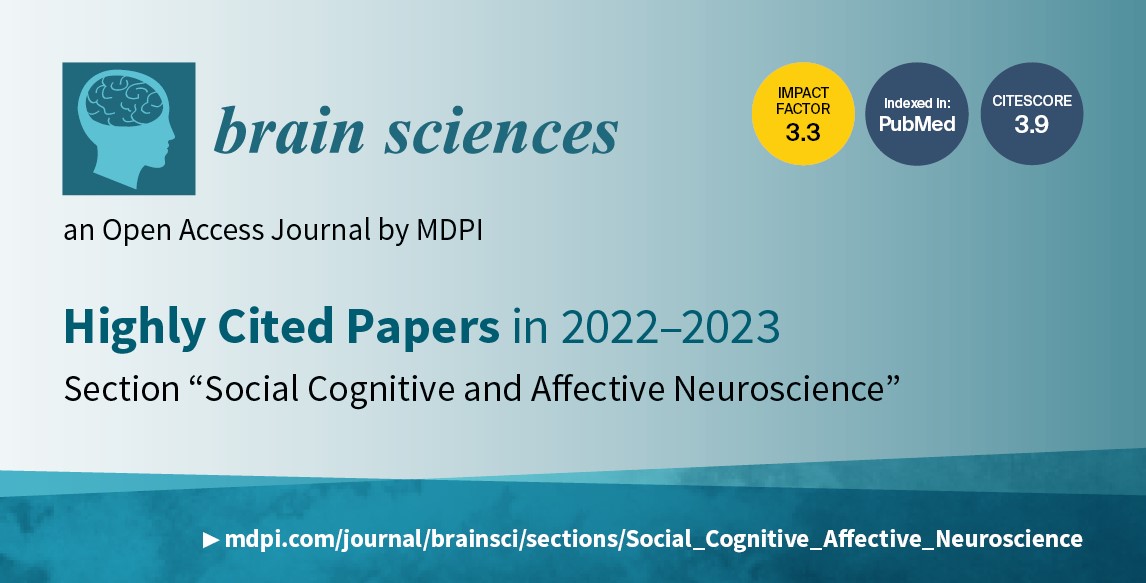
The “Social Cognitive and Affective Neuroscience” Section of Brain Sciences (ISSN: 2076-3425) aims to publish articles on social perception, cognition, emotion, and their practical applications at the behavioral, system, neural circuit, single cell, cellular, and genetic levels.
As all of the articles published in our journal are of an open access format, you have free and unlimited access to the full text. We welcome you to read our most highly cited papers published in 2022 and 2023.
1. “Attachment, Mentalizing and Trauma: Then (1992) and Now (2022)”
by Peter Fonagy, Chloe Campbell and Patrick Luyten
Brain Sci. 2023, 13(3), 459; https://doi.org/10.3390/brainsci13030459
Available online: https://www.mdpi.com/2076-3425/13/3/459
2. “Impact of Physical Exercise Alone or in Combination with Cognitive Remediation on Cognitive Functions in People with Schizophrenia: A Qualitative Critical Review”
by Giacomo Deste, Daniele Corbo, Gabriele Nibbio, Mauro Italia, Dario Dell’Ovo, Irene Calzavara-Pinton, Jacopo Lisoni, Stefano Barlati, Roberto Gasparotti and Antonio Vita
Brain Sci. 2023, 13(2), 320; https://doi.org/10.3390/brainsci13020320
Available online: https://www.mdpi.com/2076-3425/13/2/320
3. “Cognition, Behavior, Sexuality, and Autonomic Responses of Women with Hypothalamic Amenorrhea”
by Carlo Pruneti and Sara Guidotti
Brain Sci. 2022, 12(11), 1448; https://doi.org/10.3390/brainsci12111448
Available online: https://www.mdpi.com/2076-3425/12/11/1448
4. “Wearing a Mask Shapes Interpersonal Space during COVID-19 Pandemic”
by Monica Biggio, Ambra Bisio, Valentina Bruno, Francesca Garbarini and Marco Bove
Brain Sci. 2022, 12(5), 682; https://doi.org/10.3390/brainsci12050682
Available online: https://www.mdpi.com/2076-3425/12/5/682
5. “The Shape of the Olfactory Bulb Predicts Olfactory Function”
by Xiaoguang Yan, Akshita Joshi, Yunpeng Zang, Francisca Assunção, Henrique M. Fernandes and Thomas Hummel
Brain Sci. 2022, 12(2), 128; https://doi.org/10.3390/brainsci12020128
Available online: https://www.mdpi.com/2076-3425/12/2/128
6. “Play Smart, Be Smart? Effect of Cognitively Engaging Physical Activity Interventions on Executive Function among Children 4~12 Years Old: A Systematic Review and Meta-Analysis”
by Wenjing Song, Leyi Feng, Junwei Wang, Feifei Ma, Jiebo Chen, Sha Qu and Dongmei Luo
Brain Sci. 2022, 12(6), 762; https://doi.org/10.3390/brainsci12060762
Available online: https://www.mdpi.com/2076-3425/12/6/762
7. “Preventive Strategies for Cognitive Decline and Dementia: Benefits of Aerobic Physical Activity, Especially Open-Skill Exercise”
by Takao Yamasaki
Brain Sci. 2023, 13(3), 521; https://doi.org/10.3390/brainsci13030521
Available online: https://www.mdpi.com/2076-3425/13/3/521
8. “Verification of the Four-Stage Model of Humor Processing: Evidence from an fMRI Study by Three-Element Verbal Jokes”
by Chia-Yueh Chang, Yu-Chen Chan and Hsueh-Chih Chen
Brain Sci. 2023, 13(3), 417; https://doi.org/10.3390/brainsci13030417
Available online: https://www.mdpi.com/2076-3425/13/3/417
9. “Parkinson’s Disease, SARS-CoV-2, and Frailty: Is There a Vicious Cycle Related to Hypovitaminosis D?”
by Sara Palermo, Mario Stanziano Anna Nigri, Cristina Civilotti and Alessia Celeghin
Brain Sci. 2023, 13(4), 528; https://doi.org/10.3390/brainsci13040528
Available online: https://www.mdpi.com/2076-3425/13/4/528
10. “The Creative Drummer: An EEG-Based Pilot Study on the Correlates of Emotions and Creative Drum Playing”
by Rafael Ramirez-Melendez and Xavier Reija
Brain Sci. 2023, 13(1), 88; https://doi.org/10.3390/brainsci13010088
Available online: https://www.mdpi.com/2076-3425/13/1/88
7 April 2024
Brain Sciences | Highly Cited Papers in 2022–2023 in the Section “Systems Neuroscience”
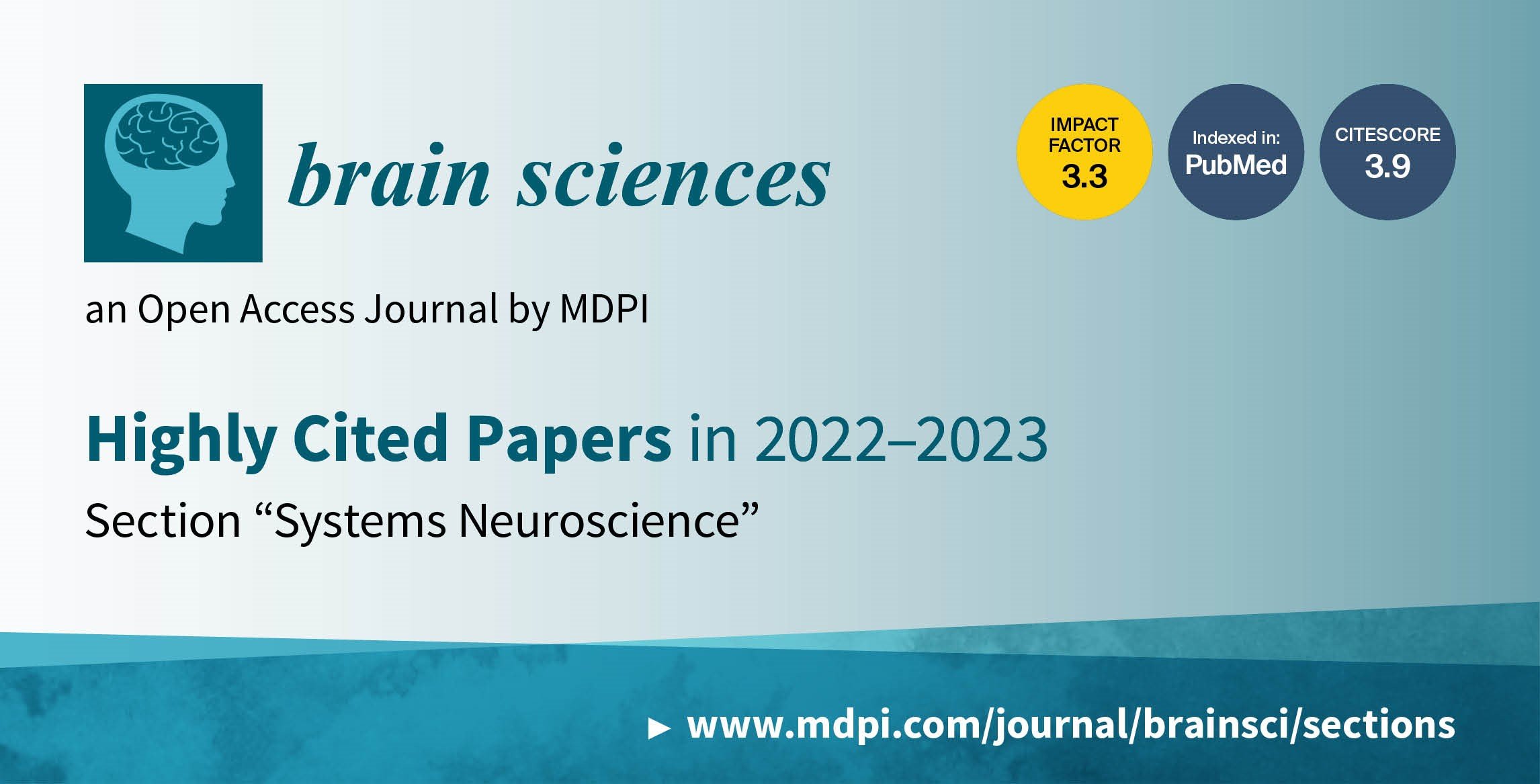
The “Systems Neuroscience” Section is dedicated to the research and exploration of multifactorial and multidimensional processes, such as normal and pathological aspects of sensory and motor functions; the activity of limbic and cognitive systems; and cerebral control of homeostasis, locomotion, reproduction, etc. By building a bridge between various theoretical concepts, basic science research, and clinical medicine applications, the “Systems Neuroscience” Section of the journal provides an in-depth analysis of the intricate workings of the nervous system. The focus of this Section goes beyond isolated aspects of neuroscience research and dedicates itself to a more comprehensive view of neural mechanisms and functionality.
As all of the articles published in our journal are of an open access format, you have free and unlimited access to the full texts. We welcome you to read our most highly cited papers published in 2022 and 2023 listed below.
1. “Innovative Technologies in the Neurorehabilitation of Traumatic Brain Injury: A Systematic Review”
by Mirjam Bonanno, Rosaria De Luca, Alessandro Marco De Nunzio, Angelo Quartarone and Rocco Salvatore Calabrò
Brain Sci. 2022, 12(12), 1678; https://doi.org/10.3390/brainsci12121678
Available online: https://www.mdpi.com/2076-3425/12/12/1678
2. “Serum Mature BDNF Level Is Associated with Remission Following ECT in Treatment-Resistant Depression”
by Marion Psomiades, Marine Mondino, Filipe Galvão, Nathalie Mandairon, Mikail Nourredine, Marie-Françoise Suaud-Chagny and Jérôme Brunelin
Brain Sci. 2022, 12(2), 126; https://doi.org/10.3390/brainsci12020126
Available online: https://www.mdpi.com/2076-3425/12/2/126
3. “Changes in the Intranetwork and Internetwork Connectivity of the Default Mode Network and Olfactory Network in Patients with COVID-19 and Olfactory Dysfunction”
by Hui Zhang, Tom Wai-Hin Chung, Fergus Kai-Chuen Wong, Ivan Fan-Ngai Hung and Henry Ka-Fung Mak
Brain Sci. 2022, 12(4), 511; https://doi.org/10.3390/brainsci12040511
Available online: https://www.mdpi.com/2076-3425/12/4/511
4. “It Takes Two: Interpersonal Neural Synchrony Is Increased after Musical Interaction”
by Alexander Khalil, Gabriella Musacchia and John Rehner Iversen
Brain Sci. 2022, 12(3), 409; https://doi.org/10.3390/brainsci12030409
Available online: https://www.mdpi.com/2076-3425/12/3/409
5. “Determining the Effects of Transcranial Direct Current Stimulation on Tinnitus, Depression, and Anxiety: A Systematic Review”
by Bas Labree, Derek J. Hoare, Lauren E. Gascoyne, Polly Scutt, Cinzia Del Giovane and Magdalena Sereda
Brain Sci. 2022, 12(4), 484; https://doi.org/10.3390/brainsci12040484
Available online: https://www.mdpi.com/2076-3425/12/4/484
6. “Neurological Prognostic Factors in Hospitalized Patients with COVID-19”
by Leszek Drabik, Justyna Derbisz, Zaneta Chatys-Bogacka, Iwona Mazurkiewicz, Katarzyna Sawczynska, Tomasz Kesek, Jacek Czepiel, Pawel Wrona, Joanna Szaleniec, Malgorzata Wojcik-Bugajska et al.
Brain Sci. 2022, 12(2), 193; https://doi.org/10.3390/brainsci12020193
Available online: https://www.mdpi.com/2076-3425/12/2/193
7. “Using Inhibitory DREADDs to Silence LC Neurons in Monkeys”
by Pauline Perez, Estelle Chavret-Reculon, Philippe Ravassard and Sebastien Bouret
Brain Sci. 2022, 12(2), 206; https://doi.org/10.3390/brainsci12020206
Available online: https://www.mdpi.com/2076-3425/12/2/206
8. “Dopamine Function and Hypothalamic-Pituitary-Thyroid Axis Activity in Major Depressed Patients with Suicidal Behavior”
by Fabrice Duval, Marie-Claude Mokrani, Vlad Danila, Alexis Erb, Felix Gonzalez Lopera and Mihaela Tomsa
Brain Sci. 2022, 12(5), 621; https://doi.org/10.3390/brainsci12050621
Available online: https://www.mdpi.com/2076-3425/12/5/621
9. “Effects of Aerobic Training on Brain Plasticity in Patients with Mild Cognitive Impairment: A Systematic Review of Randomized Controlled Trials”
by Farid Farhani, Shahnaz Shahrbanian, Mohammad Auais, Amir Hossein Ahmadi Hekmatikar and Katsuhiko Suzuki
Brain Sci. 2022, 12(6), 732; https://doi.org/10.3390/brainsci12060732
Available online: https://www.mdpi.com/2076-3425/12/6/732
10. “Optimized Deep Brain Stimulation Surgery to Avoid Vascular Damage: A Single-Center Retrospective Analysis of Path Planning for Various Deep Targets by MRI Image Fusion”
by Xin Wang, Nan Li, Jiaming Li, Huijuan Kou, Jing Wang, Jiangpeng Jing, Mingming Su, Yang Li, Liang Qu and Xuelian Wang
Brain Sci. 2022, 12(8), 967; https://doi.org/10.3390/brainsci12080967
Available online: https://www.mdpi.com/2076-3425/12/8/967
11. “Sleep in Disorders of Consciousness: A Brief Overview on a Still under Investigated Issue”
by Loredana Raciti, Gianfranco Raciti, David Militi, Paolo Tonin, Angelo Quartarone and Rocco Salvatore Calabrò
Brain Sci. 2023, 13(2), 275; https://doi.org/10.3390/brainsci13020275
Available online: https://www.mdpi.com/2076-3425/13/2/275
12. “Multi-Frequency Electrocochleography and Electrode Scan to Identify Electrode Insertion Trauma during Cochlear Implantation”
by Aniket A. Saoji, Madison K. Graham, Weston J. Adkins, Kanthaiah Koka, Matthew L. Carlson, Brian A. Neff, Colin L. W. Driscoll and Douglas C. Fitzpatrick
Brain Sci. 2023, 13(2), 330; https://doi.org/10.3390/brainsci13020330
Available online: https://www.mdpi.com/2076-3425/13/2/330
13. “Sex Differences in Cognitive-Motor Dual-Task Training Effects and in Brain Processing of Semi-Elite Basketball Players”
by Stefania Lucia, Merve Aydin and Francesco Di Russo
Brain Sci. 2023, 13(3), 443; https://doi.org/10.3390/brainsci13030443
Available online: https://www.mdpi.com/2076-3425/13/3/443
14. “The Use of Neurofeedback in Sports Training: Systematic Review”
by Łukasz Rydzik, Wojciech Wąsacz, Tadeusz Ambroży, Norollah Javdaneh, Karolina Brydak and Marta Kopańska
Brain Sci. 2023, 13(4), 660; https://doi.org/10.3390/brainsci13040660
Available online: https://www.mdpi.com/2076-3425/13/4/660
15. “Excitatory Dorsal Lateral Prefrontal Cortex Transcranial Magnetic Stimulation Increases Social Anxiety”
by Anthony Minervini, Adriana LaVarco, Samantha Zorns, Ruth Propper, Christos Suriano and Julian Paul Keenan
Brain Sci. 2023, 13(7), 989; https://doi.org/10.3390/brainsci13070989
Available online: https://www.mdpi.com/2076-3425/13/7/989
16. “The Brain’s Glymphatic System: Drawing New Perspectives in Neuroscience”
by Alexandru Vlad Ciurea, Aurel George Mohan, Razvan-Adrian Covache-Busuioc, Horia Petre Costin and Vicentiu Mircea Saceleanu
Brain Sci. 2023, 13(7), 1005; https://doi.org/10.3390/brainsci13071005
Available online: https://www.mdpi.com/2076-3425/13/7/1005
2 April 2024
MDPI Insights: The CEO's Letter #10 - South Korea, IWD, U2A, Japan

Welcome to the MDPI Insights: The CEO's Letter.
In these monthly letters, I will showcase two key aspects of our work at MDPI: our commitment to empowering researchers and our determination to facilitating open scientific exchange.
Opening Thoughts

Left to right: Dr. Jisuk Kang (Scientific Officer, MDPI), Stefan Tochev (CEO, MDPI), and Dr. Giulia Stefenelli (Chair of Scientific Office Board, MDPI), during media meetings at Prain Agency office in Seoul, South Korea.
Visit to Seoul, South Korea
During my recent visit to South Korea, I had the privilege of meeting various stakeholders, including representatives of government, research institutions, and academia, to understand their needs and communicate MDPI’s commitment to accessible science. Accompanied by my colleagues Dr. Giulia Stefenelli and Dr. Jisuk Kang, I engaged with the Korean scientific community, which is increasingly embracing open access (OA).
As the leading OA publisher in South Korea, MDPI is trusted by local authors and in 2023 enjoyed an approximately 30% share of the OA market. South Korea ranks sixth globally for MDPI in terms of research papers submitted and published.
MDPI and South Korea by Numbers
As at 30 March, over 76,000 MDPI articles have been authored by individuals affiliated with Korean institutions. We have over 1,800 active editorial board members (EBMs) from South Korea, with more than 880 EBMs having an H-index between 26 and 50, including 10 serving as Chief Editors.
“South Korea is the sixth-largest contributor to our total publications”
Over the past five years (2019–2023), nearly 120,000 authors affiliated with South Korean institutes have published with MDPI. Specifically in 2023, we received approximately 25,000 submissions from South Korean authors, publishing close to 13,000 articles, resulting in a rejection rate of 47.4%, which is not far below MDPI’s overall rejection rate of 56.4% in 2023.
Institutional Partnerships with South Korea
I am pleased to share that MDPI has more than 825 institutional partnerships worldwide, with 12 in South Korea, including Kyunghee University, Chung-Ang University, and Inha University, among others.

Left to right: Dr. Jisuk Kang (Scientific Officer, MDPI), Dr. Giulia Stefenelli (Chair of Scientific Office Board, MDPI), and Stefan Tochev (CEO, MDPI) fielding media questions at Prain PR Agency office in Seoul, South Korea.
Over the past three years (2021–2023), we have had some of the most prestigious academic universities ranked among the top 10 Korean institutions publishing with MDPI. Seoul National University had the highest number of publications with MDPI during those three years, publishing nearly 6,000 papers. Universities such as Korea University and Yonsei University also rank among the top 10 Korean institutions publishing with MDPI.
MDPI Hosts Seminar for Academia and Media
As the world’s leading OA publisher, MDPI is actively democratizing science. This is reflected in the seminars we hosted on 21 March to address questions about our editorial processes and ethical standards. The visit garnered media coverage, reflecting our mission to providing high-quality services and fostering open dialogue in the community.
“MDPI is actively democratizing science”
MDPI in the News

Stefan Tochev (CEO, MDPI) leading a seminar on OA and MDPI at Prain PR Agency office in Seoul, South Korea.
Media coverage generated by our visit to Seoul included the following stories:
“Open access is an unstoppable trend…it will lead the development of the knowledge ecosystem.”
I greatly appreciate the contributions of everyone who took the time to meet with us, share their stories, and hold us accountable for continuing to provide high-quality publishing services while identifying areas for improvement. I am also excited to announce that we have opened an MDPI office in Seoul and will release a press release on MDPI.com, with details, by the end April 2024. The purpose of the office is to establish a local presence to connect with and support the South Korean academic community through institutional partnerships, conferences, author workshops, stakeholder communications, and more.
Impactful Research

Featured Articles on Women’s Leadership and Healthcare
In celebration of International Women’s Day (8 March 2024), MDPI curated a collection of research articles on various topics, including women’s leadership, reproductive health, preventive healthcare, and a selection of articles from our journal Women.
Women’s Leadership
- Women Entrepreneurship and Sustainable Development: Bibliometric Analysis and Emerging Research Trends
Sustainability 2022, 14, 9160. https://doi.org/10.3390/su14159160 - Refugee Women Business Mentors: New Evidence for Women’s Empowerment
Sustainability 2022, 14, 9154. https://doi.org/10.3390/su14159154 - Women and Leadership in Higher Education: A Systematic Review
Soc. Sci. 2023, 12, 555. https://doi.org/10.3390/socsci12100555 - Understanding Needs and Potentials for Gender-Balanced Empowerment and Leadership in Climate Change Adaptation and Mitigation in Africa
Sustainability 2022, 14, 9410. https://doi.org/10.3390/su14159410 - Challenges Women Experience in Leadership Careers: An Integrative Review
Merits 2023, 3, 366-389. https://doi.org/10.3390/merits3020021
Women’s Reproductive Health
- Recreational Female Athletes’ Understanding of and Perceived Impact of the Menstrual Cycle on Physical Performance, Mood, and Sleeping Behaviour
Women 2023, 3, 445-456. https://doi.org/10.3390/women3030034 - Difficulties in Adaptation of the Mother and Newborn via Cesarean Section versus Natural Birth—A Narrative Review
Life 2023, 13, 300. https://doi.org/10.3390/life13020300 - The Main Theories on the Pathogenesis of Endometriosis
Int. J. Mol. Sci. 2023, 24, 4254. https://doi.org/10.3390/ijms24054254
Women’s Preventive Healthcare
- Insulin Metabolism in Polycystic Ovary Syndrome: Secretion, Signaling, and Clearance
Int. J. Mol. Sci. 2023, 24, 3140. https://doi.org/10.3390/ijms24043140 - Assessing Barriers Encountered by Women in Cervical Cancer Screening and Follow-Up Care in Urban Bolivia, Cochabamba
Healthcare 2022, 10, 1604. https://doi.org/10.3390/healthcare10091604 - Updates on HPV Vaccination
Diagnostics 2023, 13, 243. https://doi.org/10.3390/diagnostics13020243
Featured Articles in MDPI Journal Women
Below are a few articles from Women, our journal focused on women’s health, the social determinants of health, and the healthcare system that serves women. The aim of Women is to encourage academics to publish their experimental and theoretical results in detail, to aid reproducibility, and in an engaging style, to aid comprehensibility.
- Premenstrual Syndrome and Exercise: A Narrative Review
Women 2023, 3, 348-364. https://doi.org/10.3390/women3020026 - Increasing Awareness of the Human Papillomavirus (HPV) Vaccine for Women 18–45 Years of Age
Women 2023, 3, 365-373. https://doi.org/10.3390/women3030027 - Addressing Women’s Needs with Human Immunodeficiency Virus (HIV) and Enhancing the Visibility of Pharmacists in the Public Health Arena
Women 2022, 2, 346-352. https://doi.org/10.3390/women2040032
Inside MDPI

Championing Women’s Healthcare and Access to Healthcare Information
MDPI colleagues from our offices joined in celebrating #IWD2024. In doing so, we emphasized key missions that encompass:
- Empowering women to assume leadership and decision-making roles in both business and science.
- Helping women and girls make informed decisions about their health.
- Recruiting and developing female talent and fostering inclusive workplace environments.
“We are thrilled to recognize the accomplishments of women scientists”
I am proud to see our colleagues enthusiastically supporting the International Women’s Day call to ‘Inspire Inclusion!’ The heart-hands in the collage below symbolize our appreciation of the achievements of women researchers and the recognition of the trailblazers who have courageously made a mark on societies past and present.

We are thrilled to recognize the accomplishments of women scientists through our many MDPI awards and by highlighting success stories. As inspirational figures, female scientists are paving the way for the next generation of women aspiring to pursue careers in engineering, life sciences, computing, and various other STEM fields.
“I consider myself lucky because I work with incredibly talented women who inspire me every day.”
– Dr. Alessandra Pasut, Winner of MDPI's ‘Biology 2023 Young Investigator Award’
“It’s really important to find a supportive and enabling environment in which to do your science; it would have a big impact on you as a person and on your scientific outputs.”
– Dr. Rhea Longley, Winner of the ‘Pathogens 2023 Young Investigator Award’
Open-access publishing, in particular, allows early-career women researchers to share their work more widely, potentially attracting mentorship opportunities and collaborations. This support is crucial for career development and advancement.
Coming Together for Science

MDPI Joins United2Act in Collective Fight to Stop Paper Mills
In my February 2024 CEO Letter, I highlighted some of our recent initiatives aimed at bolstering our commitment to research integrity, including joining the STM Integrity Hub and expanding our Research Integrity and Publication Ethics team (RIPE). Continuing our efforts in coming together for science, I am pleased to share our participation in the United2Act initiative.
The text below is taken from our official announcement:
United2Act represents an international group of stakeholders in the publishing industry committed to addressing the collective challenge posed to research integrity by paper mills.
Scientists and academic publishers have increasingly noted the alarming proliferation of paper mills, recognized as fraudulent entities seeking to manipulate the publication process for financial profit. These entities engage in fraudulent practices such as falsifying or fabricating data, selling co-authorship of fake papers, manipulating peer review, and including inappropriate citations. These actions pose a significant threat to the integrity of the scholarly record, prompting widespread concern among those involved in the academic community.
MDPI has been actively contributing to combat the undermining of the scientific record. Our editors employ a set of tools to detect potential ethical breaches within a manuscript and to tackle the issue of fake papers.
United2Act’s consensus statement is the outcome of a virtual summit held in May 2023. It involved the participation of research bodies, publishers, researchers/sleuths, universities, and publishing infrastructure from 15 countries and resulted in a Consensus Statement outlining five key areas of action for all stakeholders:
- Education and awareness
- Improve post-publication corrections
- Facilitate and organise research on paper mills
- Enable the development of trust markers
- Facilitate dialogue between stakeholders
MDPI is committed to promoting transparency and integrity in scholarly publishing and is continuing to work closely with the scientific community toward this goal.
Closing Thoughts

Left to right: Ryo Hirayama (Marketing Specialist, MDPI), Takashi Sasabe (Marketing Specialist, MDPI), Dr. Giulia Stefenelli (Chair of Scientific Office Board, MDPI), Dr. Izumi Yamamoto (Marketing Manager, MDPI), and Stefan Tochev (CEO, MDPI), at MDPI’s office in Tokyo, Japan.
Visit to Tokyo and Kyoto, Japan
In March, I had the opportunity to visit our Tokyo office and engage with stakeholders in Tokyo and Kyoto. During the visit, I also recorded a video message to welcome Japanese scholars working with MDPI and to highlight our operations in Japan.
We held meetings with Editors-in-Chief, librarians, scholars, and external consultants to gather feedback on our efforts to enhance our reputation and explore additional steps we can take in that direction. Japan's rich cultural heritage, characterized by tradition, respect, and formality, provided valuable insights into meeting the publishing needs specific to Japan.
Japan’s Open Access statistics
Over the years, we have seen a shift from subscription-only to gold OA publishing in Japan, despite the lack of an official mandate. Here are some statistics:
- 2012: 68% of articles were subscription-only, 6% were green Open Access, and 8% were gold Open Access.
- 2016: 55% of articles were subscription-only, 6% were green Open Access, and 20% were gold Open Access.
- 2022: 43% of articles were subscription-only, 7% were green Open Access, and 39% were gold Open Access.
To learn more about the history of OA in Japan as well as about future trends, please read this blog post.
“Japan is the ninth-largest contributor to our total publications”

Left to right: Stefan Tochev (CEO, MDPI), Dr. Izumi Yamamoto (Marketing Manager, MDPI), and Dr. Giulia Stefenelli (Chair of Scientific Office Board, MDPI) visiting Kyoto University in Kyoto, Japan.
MDPI and Japan by Numbers
As at 1 April, over 50,000 MDPI articles have been authored by scholars affiliated with Japanese institutions, making the country the ninth-largest contributor to our total publications. Over the past three years (2020–2023), nearly 90,000 authors affiliated with Japanese institutes have published with MDPI, and we have collaborated with over 4,600 Guest Editors from Japan.
In 2023, we published over 8,200 papers from authors associated with Japanese institutions. MDPI collaborates with 41 institutional partnerships in Japan, including the University of Tokyo, Hokkaido University, and Nagoya University. We have over 2,100 active EBMs from Japan, more than 1,050 EBMs having an H-index between 26 and 50, including 13 serving as Editors-in-Chief.
General Feedback – a side note
A general takeaway from our discussions with stakeholders from around the world is that negative perceptions of MDPI often stem from misinformation, misconceptions, or misunderstandings about MDPI and our practices. While we acknowledge our mistakes and work diligently to address them, maintaining a strong editorial procedure and robust peer-review process, I find that educating stakeholders about our how we do what we do and our ongoing improvements tends to help shift opinions.
That said, we recognize the importance of addressing individual concerns. We take feedback seriously and are continuously working to get better while not compromising the core principles that millions of authors appreciate about MDPI.
Chief Executive Officer
MDPI AG
1 April 2024
Brain Sciences | Highly Cited Papers in 2022–2023 in the Section “Neuromuscular and Movement Disorders”
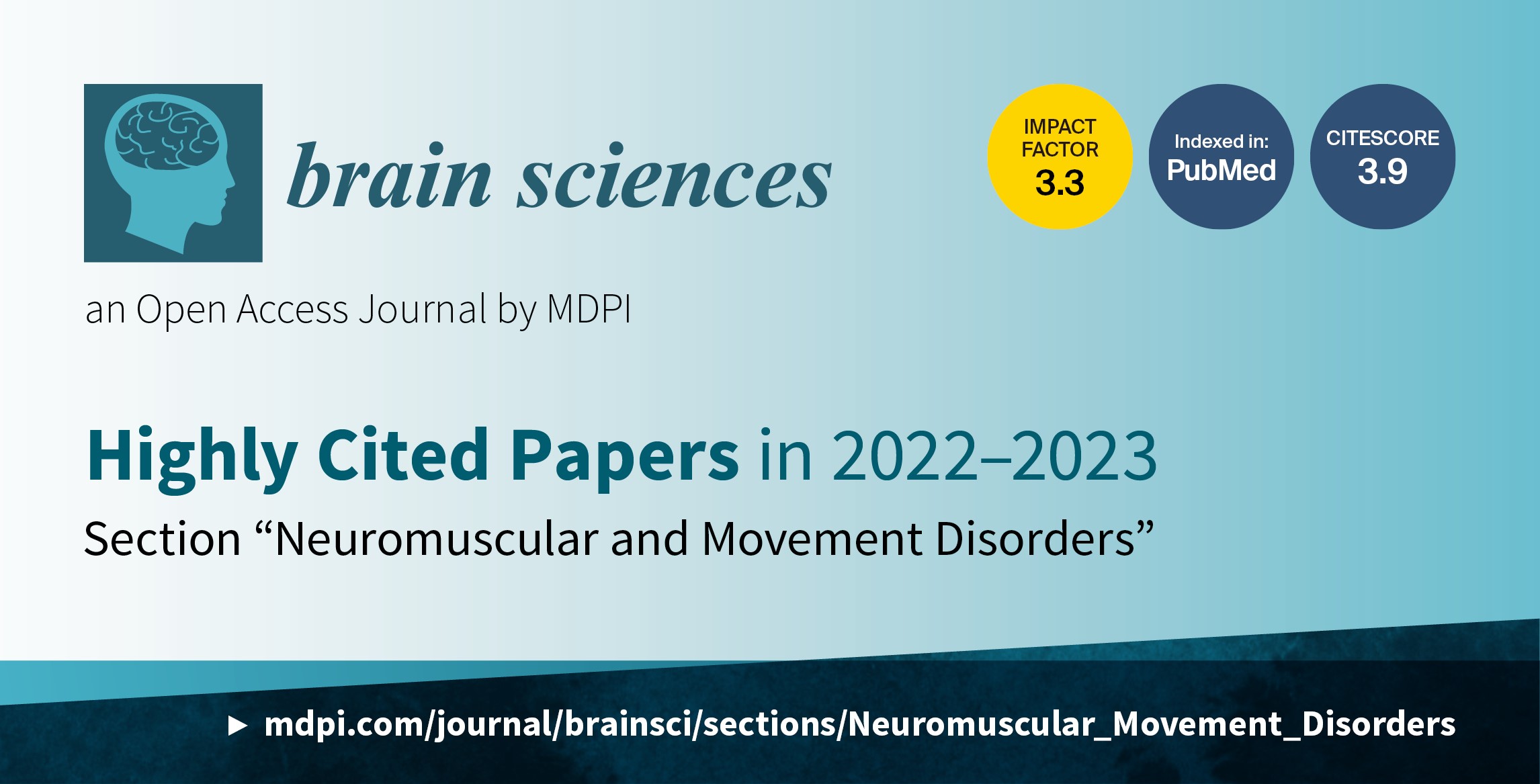
The Section “Neuromuscular and Movement Disorders” of Brain Sciences (ISSN: 2076-3425) aims to publish cutting-edge original research and critical reviews on basic science, translational research and clinical medicine that will substantially move our understanding on these disorders forward and improve the treatment of neuromuscular disease and movement disorders. The Section is international and multidisciplinary and aims to promote progress in epidemiology, etiology, genetics, and molecular and cellular biology using in vitro and in vivo models aiming to shed light on pathophysiology and pathogenesis, neuroimaging (using MRI, SPECT, PET, etc.) and other biomarkers, neuropsychology, neurophysiology, pharmacology, diagnosis, and treatment of these disorders, including neuromodulation.
As all of the articles published in our journal are of an open access format, you have free and unlimited access to the full text. We welcome you to read our most highly cited papers published in 2022 and 2023 listed below:
1. “Diagnosis and Management of Seronegative Myasthenia Gravis: Lights and Shadows”
by Claudia Vinciguerra, Liliana Bevilacqua, Antonino Lupica, Federica Ginanneschi, Giuseppe Piscosquito, Nicasio Rini, Alessandro Rossi, Paolo Barone, Filippo Brighina and Vincenzo Di Stefano
Brain Sci. 2023, 13(9), 1286; https://doi.org/10.3390/brainsci13091286
Available online: https://www.mdpi.com/2076-3425/13/9/1286
2. “Machine Learning for Early Diagnosis of ATTRv Amyloidosis in Non-Endemic Areas: A Multicenter Study from Italy”
by Vincenzo Di Stefano, Francesco Prinzi, Marco Luigetti, Massimo Russo, Stefano Tozza, Paolo Alonge, Angela Romano, Maria Ausilia Sciarrone, Francesca Vitali, Anna Mazzeo et al.
Brain Sci. 2023, 13(5), 805; https://doi.org/10.3390/brainsci13050805
Available online: https://www.mdpi.com/2076-3425/13/5/805
3. “Precision Medicine in Parkinson’s Disease: From Genetic Risk Signals to Personalized Therapy”
by Giulia Straccia, Fabiana Colucci, Roberto Eleopra and Roberto Cilia
Brain Sci. 2022, 12(10), 1308; https://doi.org/10.3390/brainsci12101308
Available online: https://www.mdpi.com/2076-3425/12/10/1308
4. “Imaging the Limbic System in Parkinson’s Disease—A Review of Limbic Pathology and Clinical Symptoms”
by Magdalena Banwinkler, Hendrik Theis, Stéphane Prange and Thilo van Eimeren
Brain Sci. 2022, 12(9), 1248; https://doi.org/10.3390/brainsci12091248
Available online: https://www.mdpi.com/2076-3425/12/9/1248
5. “Sensory Modulation in Children with Developmental Coordination Disorder Compared to Autism Spectrum Disorder and Typically Developing Children”
by Sofronia M Ringold, Riley W McGuire, Aditya Jayashankar, Emily Kilroy, Christiana D Butera, Laura Harrison, Sharon A Cermak and Lisa Aziz-Zadeh
Brain Sci. 2022, 12(9), 1171; https://doi.org/10.3390/brainsci12091171
Available online: https://www.mdpi.com/2076-3425/12/9/1171
6. “Magnetic Resonance Planimetry in the Differential Diagnosis between Parkinson’s Disease and Progressive Supranuclear Palsy”
by Andrea Quattrone, Maurizio Morelli, Maria G. Bianco, Jolanda Buonocore, Alessia Sarica, Maria Eugenia Caligiuri, Federica Aracri, Camilla Calomino, Marida De Maria, Maria Grazia Vaccaro et al.
Brain Sci. 2022, 12(7), 949; https://doi.org/10.3390/brainsci12070949
Available online: https://www.mdpi.com/2076-3425/12/7/949
28 March 2024
Brain Sciences | Highly Cited Papers in 2022–2023 in the Section “Behavioral Neuroscience”
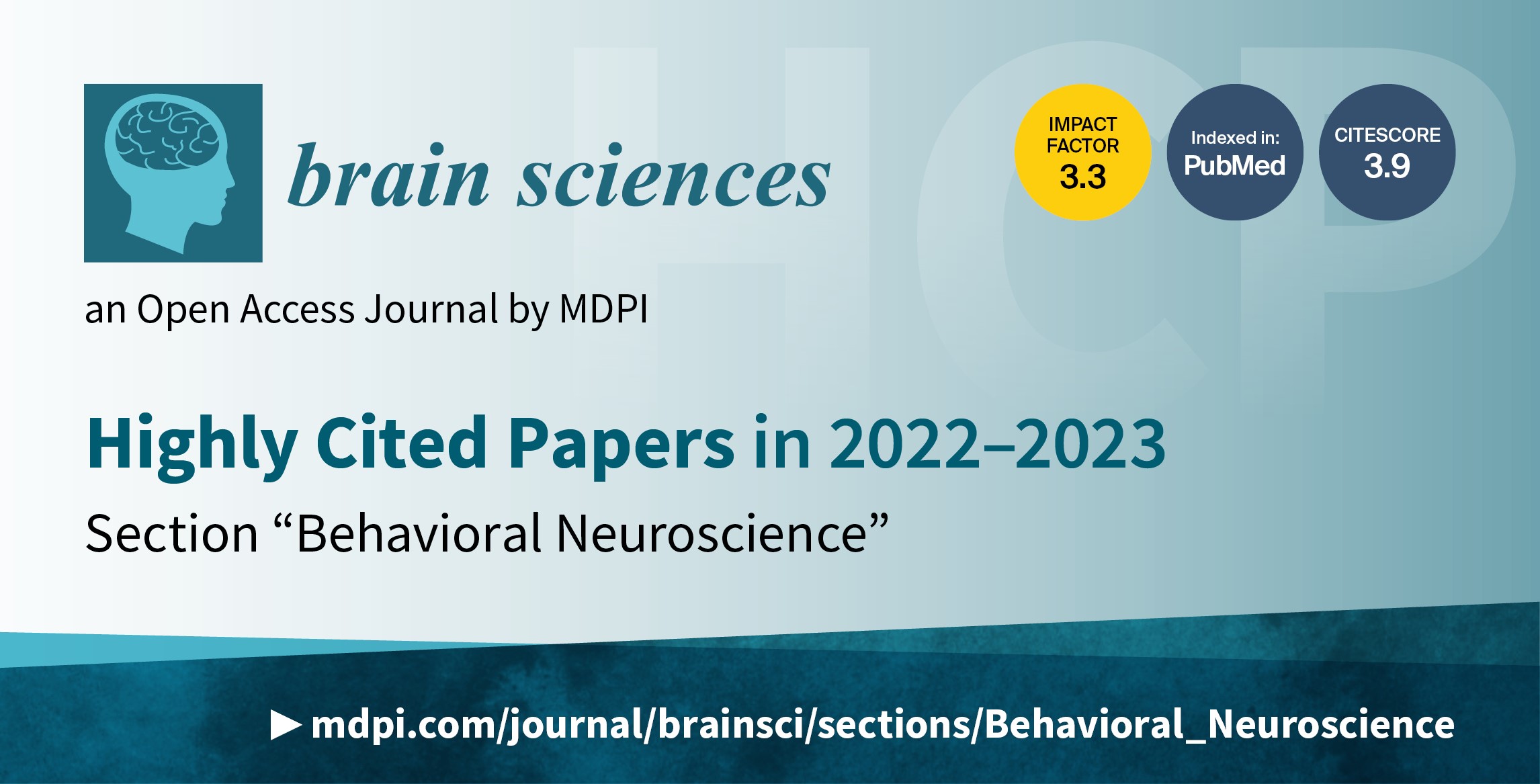
The “Behavioral Neuroscience” Section of the journal Brain Sciences (ISSN: 2076-3425) aims to publish articles on topics such as behavioral neurology, neuropsychology, learning and memory, motivation and reward, and sensory processes, among others.
As all the articles published in our journal are open access, you have free and unlimited access to the full text. We welcome you to read our most highly cited papers published in 2022 and 2023, listed below.
1. “Ultrasonic Deep Brain Neuromodulation in Acute Disorders of Consciousness: A Proof-of-Concept”
by Josh A. Cain, Norman M. Spivak, Norman M. Spivak, Julia S. Crone, Micah A. Johnson, Evan S. Lutkenhoff, Courtney Real, Manuel Buitrago-Blanco, Paul M. Vespa, Caroline Schnakers et al.
Brain Sci. 2022, 12(4), 428; https://doi.org/3390/brainsci12040428
Available online: https://www.mdpi.com/2076-3425/12/4/428
2. “Magnetic Resonance Imaging Confirmed Olfactory Bulb Reduction in Long COVID-19: Literature Review and Case Series”
by Andrea Frosolini, Daniela Parrino, Cristoforo Fabbris, Francesco Fantin, Ingrid Inches, Sara Invitto, Giacomo Spinato and Cosimo De Filippis
Brain Sci. 2022, 12(4), 430; https://doi.org/10.3390/brainsci12040430
Available online: https://doi.org/10.3390/brainsci12040430
3. “Association between Sleep Quality and Mental Health among Patients at a Post-COVID-19 Recovery Clinic”
by Sara Nowakowski, Manasa Kokonda, Rizwana Sultana, Brittany B. Duong, Sarah E. Nagy, Mohammed F. Zaidan, Mirza M. Baig, Bryan V. Grigg, Justin Seashore and Rachel R. Deer
Brain Sci. 2022, 12(5), 586; https://doi.org/10.3390/brainsci12050586
Available online: https://www.mdpi.com/2076-3425/12/5/586
4. “The Role of Stress and Cognitive Absorption in Predicting Social Network Addiction”
by Loreta Cannito, Eugenia Annunzi, Caterina Viganò, Bernardo Dell’Osso, Matteo Vismara, Pier Luigi Sacco, Riccardo Palumbo and Claudio D’Addario
Brain Sci. 2022, 12(5), 643; https://doi.org/10.3390/brainsci12050643
Available online: https://www.mdpi.com/2076-3425/12/5/643
5. “Cognitive Performance in Short Sleep Young Adults with Different Physical Activity Levels: A Cross-Sectional fNIRS Study”
by Yanwei You, Jianxiu Liu, Dizhi Wang, Yingyao Fu, Ruidong Liu and Xindong Ma
Brain Sci. 2023, 13(2), 171; https://doi.org/10.3390/brainsci13020171
Available online: https://www.mdpi.com/2076-3425/13/2/171
6.“The Role of Serotonin in Fear Learning and Memory: A Systematic Review of Human Studies”
by Francesco Tortora, Abed L. Hadipour, Simone Battaglia, Alessandra Falzone, Alessio Avenanti and Carmelo M. Vicario
Brain Sci. 2023, 13(8), 1197; https://doi.org/10.3390/brainsci13081197
Available online: https://www.mdpi.com/2076-3425/13/8/1197
7. “Erectile Dysfunction: Treatments, Advances and New Therapeutic Strategies”
by Antonio Argiolas, Francesco Mario Argiolas, Giacomo Argiolas and Maria Rosaria Melis
Brain Sci. 2023, 13(5), 802; https://doi.org/10.3390/brainsci13050802
Available online: https://www.mdpi.com/2076-3425/13/5/802
8. “Exploring the Social Determinants of Health and Health Disparities in Traumatic Brain Injury: A Scoping Review”
by Leslie W. Johnson and Isabella Diaz
Brain Sci. 2023, 13(5), 707; https://doi.org/10.3390/brainsci13050707
Available online: https://www.mdpi.com/2076-3425/13/5/707
9. “Sleep Deprivation and Insomnia in Adolescence: Implications for Mental Health”
by Sara Uccella, Ramona Cordani, Federico Salfi, Maurizio Gorgoni, Serena Scarpelli, Angelo Gemignani, Pierre Alexis Geoffroy, Luigi De Gennaro, Laura Palagini, Michele Ferrara et al.
Brain Sci. 2023, 13(4), 569; https://doi.org/10.3390/brainsci13040569
Available online: https://www.mdpi.com/2076-3425/13/4/569
10. “Optimizing the Effect of tDCS on Motor Sequence Learning in the Elderly”
by Ensiyeh Ghasemian-Shirvan, Ruxandra Ungureanu, Lorena Melo, Kim van Dun, Min-Fang Kuo, Michael A. Nitsche and Raf L. J. Meesen
Brain Sci. 2023, 13(1), 137; https://doi.org/10.3390/brainsci13010137
Available online: https://www.mdpi.com/2076-3425/13/1/137




